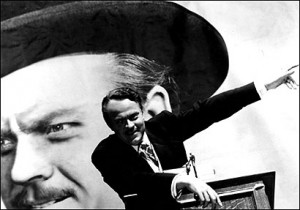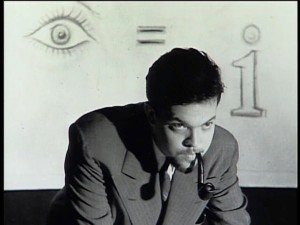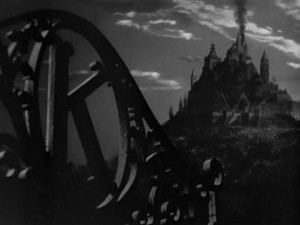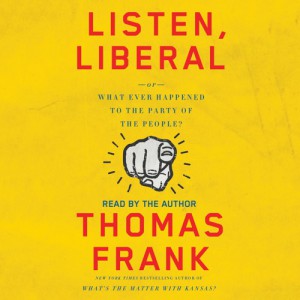A column for Caiman Cuadernos de Cine, written November 16, 2016. — J.R.
En Movimiento: The Man Who Would Be King
Errol Morris: “If you could give Charles Foster Kane advice, what would you say to him?”
Donald J. Trump: “Get yourself a different woman.”
— from a 2003 interview
It isn’t surprising that Citizen Kane is Donald Trump’s favorite movie. Thanks to the input of Herman J. Mankiewicz, an unhappy cynic, Orson Welles’ first feature is the only one he ever made that views corruption from a corrupted viewpoint; all the others see corruption from a vantage point of baffled innocence. As an actor who specialized in playing corrupt authoritarian figures — tycoons (Kane, Arkadin, Charles Clay), racists (Kindler, Quinlan), conniving magicians (Cagliostro, Welles himself in Follow the Boys and F for Fake), power-mad officials (Colonel Haki in Journey into Fear, Cesare Borgia in Prince of Foxes, the Advocate in The Trial), a sly racketeer (Harry Lime), and several dissolute rulers—before achieving his best role as Falstaff, an innocently jovial jester to a prince, which failed to engage the mass audience to the same degree (as did his more innocent heroes in The Lady from Shanghai and Othello) — Welles as an anti-authoritarian writer and director only confused matters for the general public by undermining what he celebrated as a performer. This is why the image of Orson Welles in the public mind tends to be as conflicted and as contested as the final verdict about Donald Trump, even though the two men are as diametrically opposed as any two men one could imagine.
The peculiar place occupied by Citizen Kane in the American imagination — especially after Pauline Kael successfully contrived to convert it from an independent art film into a mainstream Hollywood comedy — resembles the prestige enjoyed by the Godfather trilogy. In both cases, one finds an apologia for and even a celebration for the impudence and exhilaration found in the ruthless exercise of power. The tragic overtones offer a kind of moral escape clause that for many spectators ultimately validates the exhilaration — an ambivalence perfectly if ingenuously expressed by Donald Trump when he told Morris, “There was a great ride in Citizen Kane and a modest fall.” For Trump in the same interview, “Rosebud” figures as a kind of advertising slogan rather than as Welles’ own version of an escape clause; he conveniently forgets the nameless reporter’s caveat that one word can’t explain any man’s life.
Last June, Trump once again echoed the mainstream American fantasy about Welles when he declared, “I loved Orson Welles. He was totally fucked up. He was a total mess. But think of his wives. Think of his hits…He was like this great genius that after 26, never did it. He became totally impossible. He thought everybody was a moron, everybody was this, everybody was that; if he had a budget he’d exceed it by 20 times and destroy everything. He became impossible. I loved that.”
I’m writing in mid-November, shortly after the election of this lover of the impossible as the next U.S. President, despite trailing behind Hillary Clinton in terms of popular votes. The world-wide shock of these results has barely begun to register, although part of the lesson to be learned is that nothing can be taken for granted by people like myself who mistakenly assumed that “business as usual” would somehow prevail. One of the best forecasts of this dilemma can be found in Thomas Frank’s recent book, Listen, Liberal, or What Ever Happened to the Party of the People?, a scathing account of the Democratic Party’s declining allegiance to working-class and middle-class Americans, published shortly before the political ascendency of Bernie Sanders. It recalls Jed Leland’s charge against Kane that he spoke about “the people” as if he owned them.






